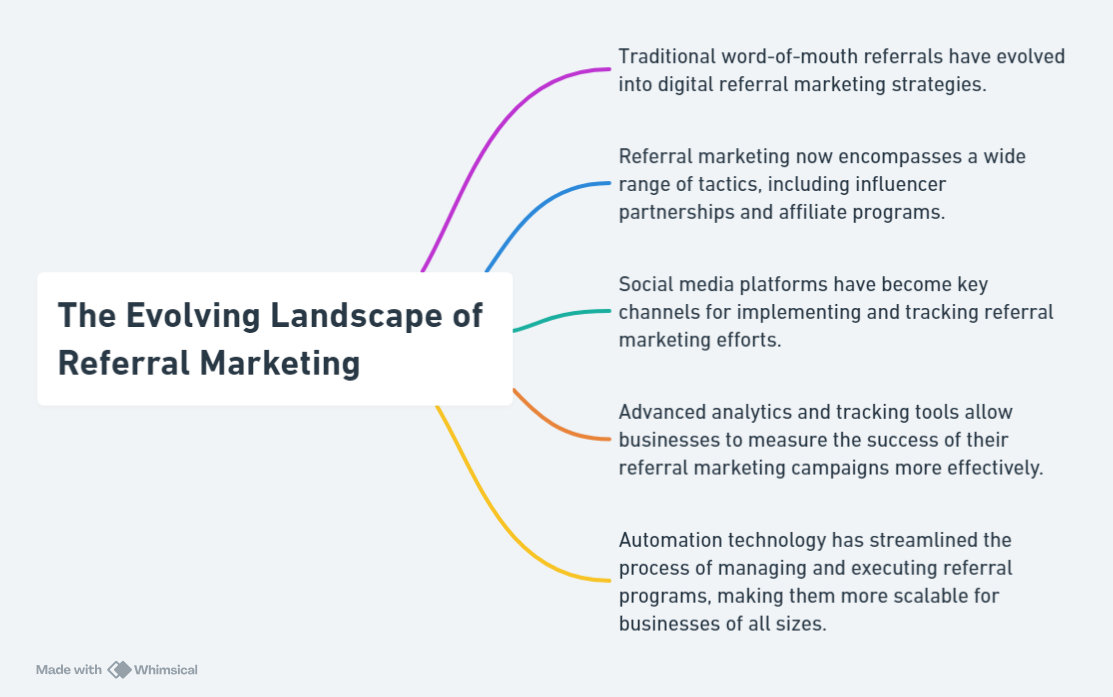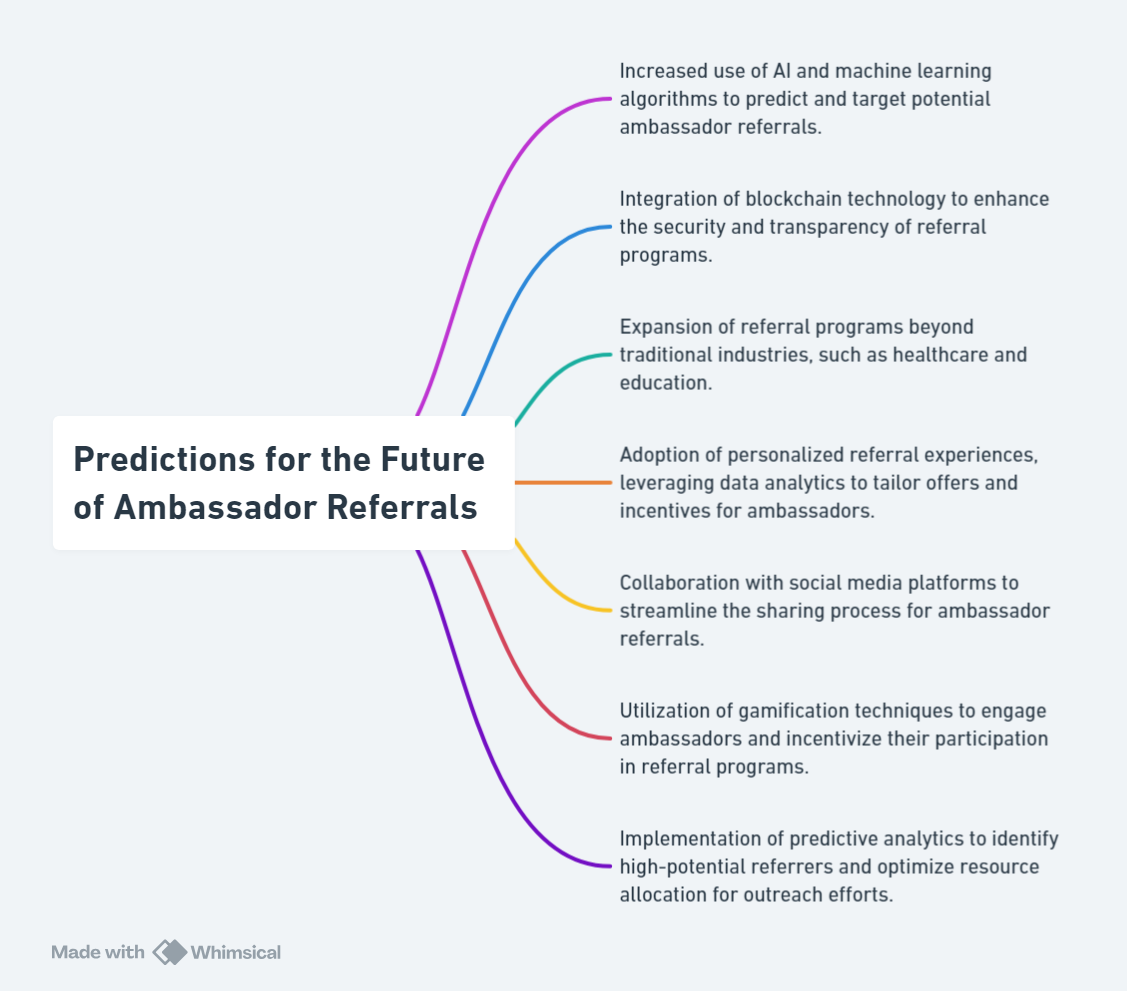In the ever-changing world of marketing, referral marketing has emerged as a powerful strategy for businesses to acquire new customers and build lasting relationships. Ambassador referral marketing, in particular, has gained significant traction due to its ability to leverage the influence and reach of brand advocates. This article explores the evolving landscape of ambassador referral marketing, examining emerging technologies, future predictions, and strategies for staying ahead in this dynamic field.
The Evolving Landscape of Referral Marketing

In the digital age, the landscape of marketing strategies has undergone significant transformations, and among these, ambassador referral marketing has emerged as a powerhouse for brand growth and customer engagement. As businesses navigate this evolving terrain, understanding the shifts and trends in ambassador referral marketing is paramount for maintaining a competitive edge and fostering organic growth.
1. The Digital Influence
The Rise of Social Media: Initially, referral marketing was predominantly a word-of-mouth strategy that depended on personal recommendations. However, with the advent of social media platforms, ambassador referral marketing has taken on a new dimension. Ambassadors now use their social networks to promote products and services, reaching a wider audience than ever before. This digital evolution has made ambassador referral marketing more measurable, scalable, and impactful.
The Power of Analytics: Modern technologies have equipped marketers with advanced analytics tools to track the success of their ambassador referral programs. Businesses can now understand exactly how their ambassadors are contributing to their marketing goals, optimizing campaigns in real time for better performance. This data-driven approach has refined ambassador referral marketing strategies, making them more targeted and effective.
2. Personalization and Authenticity
Bridging the Trust Gap: One significant shift in the landscape of ambassador referral marketing is the increasing emphasis on authenticity and personalization. Consumers today crave genuine connections with the brands they support. Ambassadors, with their real-life experiences and personal stories, bridge this trust gap, lending credibility and relatability to the brands they represent. This authenticity is a currency in today’s digital marketplace, and ambassador referral marketing capitalizes on it to enhance consumer trust and loyalty.
Customized Experiences: Personalization has also become a key component of successful ambassador referral marketing programs. Tailoring messages and offers to fit the specific interests and needs of the target audience results in higher engagement rates. Ambassadors play a crucial role in delivering these personalized experiences, leveraging their understanding of their followers to drive meaningful interactions.
3. Evolving Compensation Models
Beyond Monetary Rewards: The compensation models within ambassador referral marketing have evolved significantly. While monetary rewards remain common, there is a growing trend towards offering value in various forms, including exclusive access, products, and experiences. This shift reflects a deeper understanding of what motivates ambassadors beyond financial incentives, emphasizing the importance of a value exchange that aligns with the ambassadors’ personal brands and interests.
4. Regulatory Changes and Ethical Practices
Navigating the Legal Landscape: As ambassador referral marketing continues to grow, so does the scrutiny from regulatory bodies. Compliance with legal requirements, such as disclosing partnerships and endorsements, has become a crucial part of ambassador referral marketing strategies. This evolution towards transparency not only satisfies legal requirements but also fosters trust among consumers, further enhancing the effectiveness of ambassador referral marketing programs.
Ethical Considerations: With the increasing importance of ethics in business practices, ambassador referral marketing programs are also evolving to prioritize ethical considerations. This includes ensuring fair treatment and representation of ambassadors, as well as ethical engagement practices with audiences. The commitment to ethical practices in ambassador referral marketing strengthens brand reputation and builds long-term loyalty among both ambassadors and consumers.
Master Referral Marketing Analytics in 5 Steps in 2024
Emerging Technologies Shaping Ambassador Programs

Ambassador referral marketing is a powerful strategy for businesses to acquire new customers and build lasting relationships. Emerging technologies are transforming the way businesses implement and manage ambassador referral programs, making them more effective and efficient than ever before.
Artificial Intelligence (AI) and Machine Learning (ML)
AI and ML are being used to automate tasks, personalize experiences, and optimize program performance in ambassador referral marketing. For example, AI-powered chatbots can provide real-time support to ambassadors, answering questions and providing assistance. ML algorithms can analyze data to identify top-performing ambassadors and provide tailored incentives.
Social Media Platforms
Social media platforms are also playing a crucial role in the growth of ambassador referral marketing. With billions of active users, social media provides businesses with a vast pool of potential ambassadors. Businesses can leverage social media to recruit and engage ambassadors, distribute referral content, and track campaign performance.
Other Emerging Technologies
In addition to AI, ML, and social media, other emerging technologies are also shaping the landscape of ambassador referral marketing. These include:
- Blockchain: Blockchain technology can be used to create secure and transparent ambassador referral programs. This can help to build trust and credibility with ambassadors and customers alike.
- Virtual and augmented reality (VR/AR): VR/AR can be used to create immersive and engaging experiences for ambassadors. This can help to increase ambassador engagement and motivation.
- Internet of Things (IoT): IoT devices can be used to collect data on ambassador activity and customer behavior. This data can be used to optimize program performance and identify areas for improvement.
Referral Network Marketing: Beyond the Basics in 2024
Predictions for the Future of Ambassador Referrals

The realm of ambassador referral marketing is dynamic, constantly influenced by technological advancements, shifts in consumer behavior, and the evolving digital landscape. As brands continue to recognize the value of authentic consumer advocacy, the strategies surrounding ambassador referral marketing are set to evolve. Here, we delve into the anticipated trends and predictions that will shape the future of ambassador referral marketing.
1. Increased Integration of Technology
Leveraging AI and Machine Learning: The future of ambassador referral marketing will see an increased integration of artificial intelligence (AI) and machine learning algorithms. These technologies will enable brands to more effectively match ambassadors with their target audience, optimizing campaign performance. By analyzing data on consumer preferences and behaviors, AI can help in predicting which ambassador messages are likely to resonate most, enhancing the personalization and efficiency of ambassador referral marketing efforts.
Augmented Reality Experiences: Augmented reality (AR) is poised to become a significant tool in ambassador referral marketing, offering immersive experiences that allow consumers to interact with products in a virtual space. Ambassadors can use AR to demonstrate products in a more engaging and interactive manner, bridging the gap between online and physical shopping experiences. This technological advancement will elevate the impact of ambassador referral marketing campaigns by providing more compelling reasons for consumers to engage with and trust ambassador recommendations.
2. Focus on Micro-Influencers and Niche Communities
The Rise of Micro-Influencers: While celebrity endorsements have their place, the future of ambassador referral marketing will lean more heavily toward micro-influencers and niche ambassadors. These individuals often boast higher engagement rates and a more dedicated following due to their perceived authenticity and relatability. Ambassador referral marketing programs will increasingly tap into these smaller, more focused communities to drive meaningful engagement and conversions.
Building Niche Communities: Brands will not only partner with existing micro-influencers but will also invest in building their own niche communities of brand ambassadors. These communities will be centered around shared interests, values, or lifestyles that align closely with the brand’s identity, creating a loyal ecosystem of advocates. This approach in ambassador referral marketing will foster a deeper connection between brands and their most passionate customers, leading to more authentic and effective referrals.
3. Enhanced Emphasis on Value Alignment and Sustainability
Value Alignment: Consumers are becoming increasingly conscious of the values and ethics behind the brands they support. Ambassador referral marketing will need to reflect this shift by prioritizing partnerships with ambassadors who genuinely align with the brand’s core values and mission. This authenticity in alignment will become a critical factor in the success of ambassador referral marketing strategies, as consumers seek out brands and ambassadors that reflect their own beliefs and values.
Sustainability Practices: Alongside value alignment, sustainability will become a key consideration in ambassador referral marketing. Ambassadors who advocate for eco-friendly practices and sustainable products will be in higher demand, as both consumers and brands prioritize environmental responsibility. Ambassador referral marketing campaigns that highlight sustainability initiatives can foster a positive brand image and appeal to environmentally conscious consumers.
4. Greater Accountability and Transparency
Regulatory Compliance: As ambassador referral marketing continues to mature, it will be subject to more rigorous regulatory scrutiny to ensure transparency and fairness. Brands and ambassadors alike will need to adhere strictly to disclosure guidelines, ensuring that consumers are fully aware of the marketing relationships behind endorsements. This move towards greater transparency will enhance consumer trust and credibility in ambassador referral marketing campaigns.
Consumer Demand for Authenticity: Beyond regulatory compliance, there will be a growing consumer demand for authenticity and transparency in ambassador referral marketing. Consumers will expect genuine recommendations rather than scripted endorsements, leading to a more authentic form of marketing. Ambassadors will share their real experiences and opinions, making ambassador referral marketing more relatable and trustworthy to the audience.
The Future of Customer Referral Marketing
How to Stay Ahead in Ambassador Referral Marketing

In the competitive world of marketing, it is essential for businesses to stay ahead of the curve and adopt the latest trends and technologies. This is especially true for ambassador referral marketing, which is a rapidly evolving field. Here are a few tips for businesses to stay ahead in ambassador referral marketing:
- Embrace emerging technologies: Emerging technologies, such as AI, ML, and social media, are transforming the way businesses implement and manage ambassador referral programs. By embracing these technologies, businesses can create more effective and efficient programs that drive growth and success.
- Build strong relationships with ambassadors: Ambassadors are the cornerstone of any successful ambassador referral marketing program. Businesses need to invest in building strong relationships with their ambassadors and treat them as valued partners. This means providing them with the resources and support they need to be successful and recognizing and rewarding their contributions.
- Measure and optimize your program: Regularly tracking and analyzing the performance of your ambassador referral marketing program is essential for identifying areas for improvement and making adjustments to optimize your strategy. Use data to understand what is working well and what could be improved, and make changes accordingly.
Maximize Growth: Master Referral Marketing Business in 2024
Conclusion Ambassador referral marketing
The marketing strategy of a brand ambassador revolves around leveraging their credibility, influence, and network to promote a brand, its products, or services to a wider audience. Brand ambassadors, often chosen for their alignment with the brand’s values and appeal to its target market, use various platforms—such as social media, events, and personal interactions—to share their positive experiences and endorsements. The strategy aims to build trust, enhance brand awareness, and foster a community around the brand, ultimately driving sales and customer loyalty. By authentically engaging with their followers, ambassadors help humanize the brand, making its messaging more relatable and persuasive.
How do brands pick brand ambassadors?
Brands select brand ambassadors based on a combination of factors that align with their marketing goals and brand values. Typically, they look for individuals with a strong, engaging social media presence and a genuine affinity for their products or services. The ideal ambassadors are influential in their communities, have a demographic profile that matches the brand’s target audience, and possess the ability to create authentic content that resonates with followers. Brands also consider the ambassador’s reputation, professionalism, and previous collaborations to ensure they can foster positive perceptions and drive meaningful engagement. The selection process often involves thorough research, interviews, and sometimes, trial campaigns to gauge potential ambassadors’ effectiveness and fit with the brand’s image and objectives.

